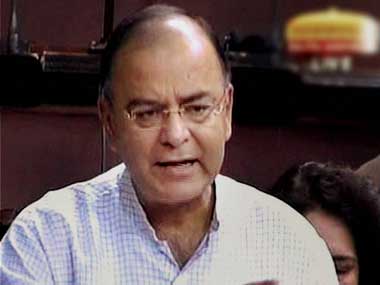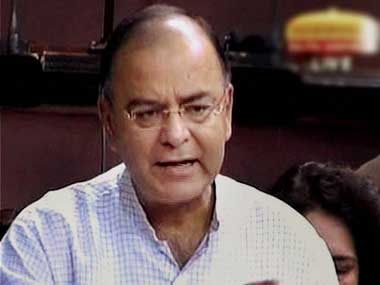Finance Minister Arun Jaitley strongly defended the government’s decision to push through the National Judicial Appointments Commission Bill, saying the bill was only seeking to restore Indian Constitutional tenets which specify that Supreme Court judges would be appointed by the Executive. Speaking in the Rajya Sabha, Jaitley referred to article 124 of the constitution that deals with the appointment of Supreme Court judges. Section 2 of the article states: Every Judge of the Supreme Court shall be appointed by the President by warrant under his hand and seal after consultation with such of the Judges of the Supreme Court and of the High Courts in the States as the President may deem necessary for the purpose and shall hold office until he attains the age of sixty five years: Provided that in the case of appointment of a Judge other than the chief Justice, the chief Justice of India shall always be consulted. [caption id=“attachment_1664177” align=“alignleft” width=“380”]  PTI[/caption] “In simple English, this means that the President and government will appoint judges to the Supreme Court,” the Finance Minister said. Jaitley went on to say that through the adoption and exercise of the collegium system to appoint Supreme Court judges, the Constitution had been virtually rewritten to ensure that judges appoint judges. “I am sure the experience of all governments - from Congress to NDA - has been the same. In effect how the judges are working is not what the Constitution says,” he said. The bill, according to Jaitley, was simply an effort to restore what the Constitution said in the first place. However he took pains to explain that this would not be a complete overrun of the judicial by the executive. “No power should and will be absolute,” he said. After the bill becomes law, the government will have a say in the appointment of Supreme Court and high court judges after 21 years. Once the commission is formed, 266 vacancies for judges in 24 high courts are likely to be filled expeditiously. The Supreme Court, which has a sanctioned strength of 31, also has one vacancy. The appointment of new judges is also expected to speed up the backlog of legal cases in courts across the country. The government had on Monday, introduced the Constitution Amendment Bill in Lok Sabha to establish a six-member body for appointment of judges to the Supreme Court and the High Courts. Under the statute amendment bill, Chief Justice of India will head the NJAC. Besides the CJI, the judiciary would be represented by two senior judges of the Supreme Court. Two eminent personalities and the Law Minister will be the other members of the proposed body. While two members of the NJAC can veto any appointment, the government can return the recommendation for “reconsideration”. Under the now-dropped provisions once the NJAC “unanimously” reiterated the recommendation, the government had no option but to accept it. On Tuesday, the Lok Sabha had a long debate on the bill with Law Minister Ravishankar Prasad saying that the government favours independence of judiciary but the “sanctity” and “supremacy” of Parliament is equally important as it reflects aspirations of the people.
Finance Minister Arun Jaitley strongly defended the government’s decision to push through the National Judicial Appointments Commission Bill, saying the bill was only seeking to restore Indian Constitutional tenets which specify that Supreme Court judges would be appointed by the Executive. Speaking in the Rajya Sabha, Jaitley referred to article 124 of the constitution that deals with the appointment of Supreme Court judges. Section 2 of the article states: Every Judge of the Supreme Court shall be appointed by the President by warrant under his hand and seal after consultation with such of the Judges of the Supreme Court and of the High Courts in the States as the President may deem necessary for the purpose and shall hold office until he attains the age of sixty five years: Provided that in the case of appointment of a Judge other than the chief Justice, the chief Justice of India shall always be consulted.
Advertisement
End of Article


)
)
)
)
)
)
)
)
)



